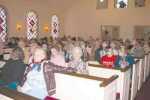Lenten Lessons -- The other Jesus in the Easter story

By DAWN CRIBBS
Associate Editor
The Rev. Emmanuel Reinbold admitted that when he heard the story as a child of Jesus before Pilate, he was frustrated by the entire scene.
Addressing a crowd of nearly 160 Friday afternoon at First Congregational Church, the pastor from the McCook First Church of the Nazarene confessed that, first of all, he simply could not figure out what kind of judge would allow an innocent man to be flogged.
As he matured and studied, he realized that in the Roman world there was no such thing as a "Bill of Rights," and, in any case, rights weren't something assigned to a a citizen of an occupied and oppressed people.
Turning his attention away from Pilate, Reinbold presented the problem of the crowd assembled there that day.
Reinbold first looked at the crowd that had accompanied Jesus into Jerusalem earlier that week.
"As a child, I was baffled that the crowd -- which days earlier had welcomed Jesus with palm branches and praise -- could so easily turn on him and cry 'Crucify him!' just days later," Reinbold said.
Again, time and study revealed a new insight. "Jesus entered Jerusalem from Bethany," Reinbold explained. Bethany was the home of Lazarus, whom Jesus had raised from the dead. Most likely, many of the people in the crowd had traveled with Jesus from Bethany, that miracle and others fresh in their minds.
The crowd in Pilate's courtyard probably weren't the same ones who had attended the impromptu parade on the first day of the week. They were in Pilate's court to see which prisoner Pilate would release according to their Passover custom.
"Keep in mind," Reinbold continued, "Jesus had been arrested in the middle of the night. The trial had taken place under cover of darkness.
Now, in the light of day,"Many of Jesus' followers would have been unaware that anything was going on. They simply weren't in this crowd."
The people that were there looked forward to this time of release every year, when at least one of their brethren would be freed from Rome's cruel justice.
Reinbold cautioned however, that this crowd also would have been easily intimidated by the governor. The Jews were under Roman occupation and had tasted years of oppression at Rome's hand. Oppression such as that experienced by the Jews is, at best, an unfamiliar situation to most Americans. These people, the hated Romans, held the power of life or death, freedom or servitude over the Jewish people. Until they could be overthrown and Israel freed from their tyranny, they were to be, at all cost, appeased.
This then was the mood when Pilate went out to the Jews and said, "I find no basis for a charge against him. But it is your custom for me to release to you one prisoner at the time of the Passover. Do you want me to release 'the king of the Jews''?
"They shouted back, 'No, not him, give us Barabbas!' Now Barabbas had taken part in a rebellion."
That final clause is key to the crowd, and the decision reached, Reinbold explained.
On the one hand, you have Jesus the Christ, who, rather than warring against Rome, commanded the people that if they were compelled to carry another's burden a mile, even the burden of a Roman citizen, they should carry the burden two miles.
This Jesus commanded the Jews to render unto Caesar that which was Caeser's; and had even made a disciple of a hated tax-collector.
Barabbas, however, had led a rebellion against Rome. An accused murderer, in the eyes of this crowd, he had proved his allegiance to Israel and he had engaged in the battle all Jews wanted to fight, but could not.
Reinbold then noted that in the earliest gospel manuscripts, the name Barabbas is preceded by the first name, Jesus, a common name of the time. The question, recorded in Matthew 27:17 then becomes "Which one do you want me to release to you: Jesus Barabbas or Jesus who is called Christ?"
Given a choice, then, the people chose the rebel, the Jesus who demonstrated the dream of freedom everyone wanted. They wanted a Messiah to free them from Roman tyranny. They wanted freedom from outside oppression.
Jesus the Christ offers freedom from the inner oppressor, Reinbold explained. He offered then, and now, inward relief from the heart oppression of sin.
Which Jesus are we looking for, Reinbold wondered? "Do we want a Jesus to deal with the outward circumstances?
"Or will we choose the Jesus who will deal with the inner condition of our hearts?'
The Rev. Clark Bates, pastor at McCook Christian Church, served as worship leader. Bates will present the lesson at 12:05 p.m., next Friday. at First Congregational Church, 212 East E.
Joyce Hershberger set the mood for the congregation with an elegant arrangement of "Beneath the Cross of Jesus," and Jessi Keslin charmed the room with the spiritual "He Never Said a Mumbalin' Word," accompanied by Marie Coffey.
The women's ministry from the Nazarene church prepared and served a wonderful offering of sandwiches, hot soups and cakes immediately following the service.
As the sponsoring organization, the Red Willow County Ministerial Association accepted free will offerings at the entrances to the sanctuary to support the work of the ministerial through the year and offerings also were accepted at the serving lines at the luncheon to help offset the cost of the food.
